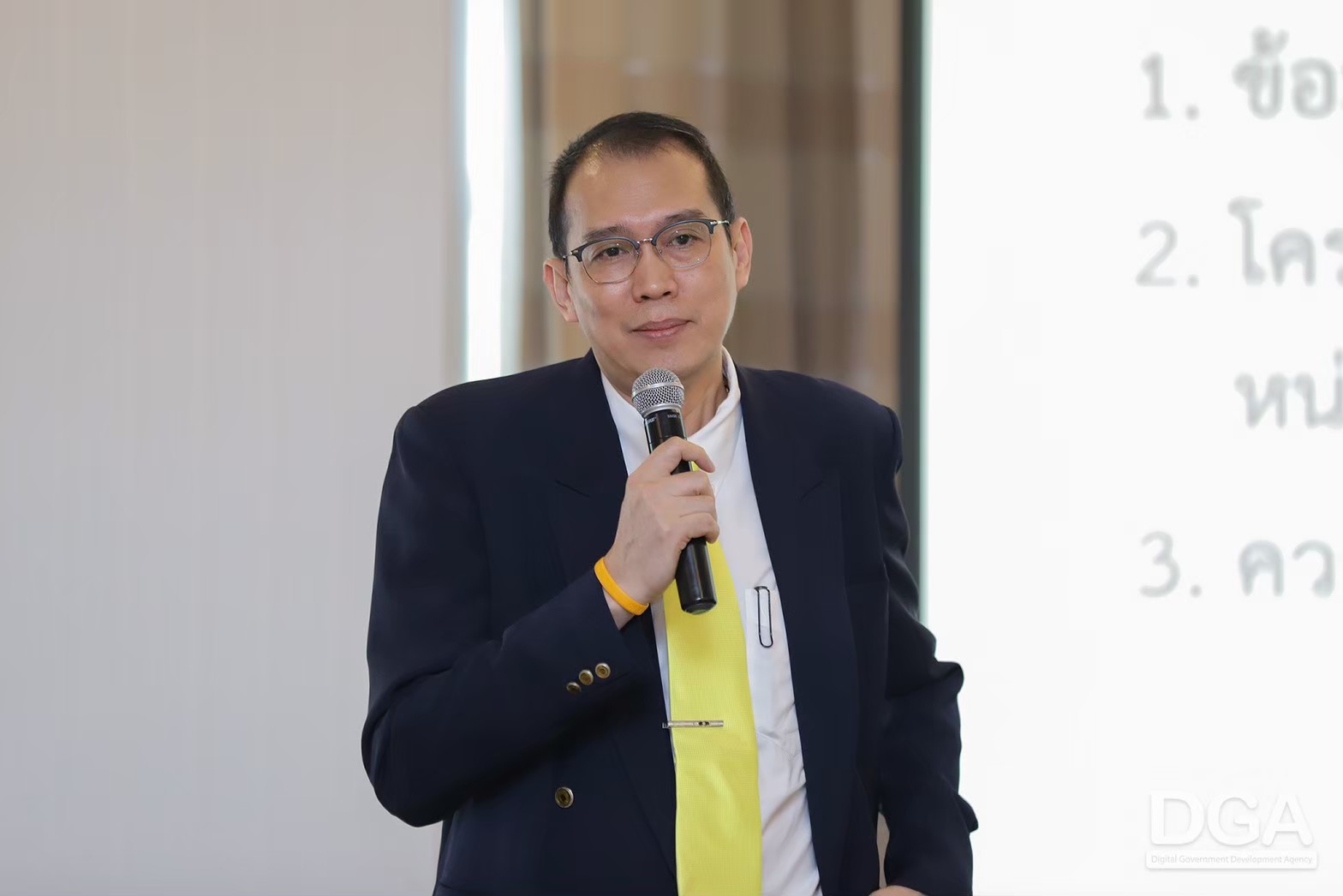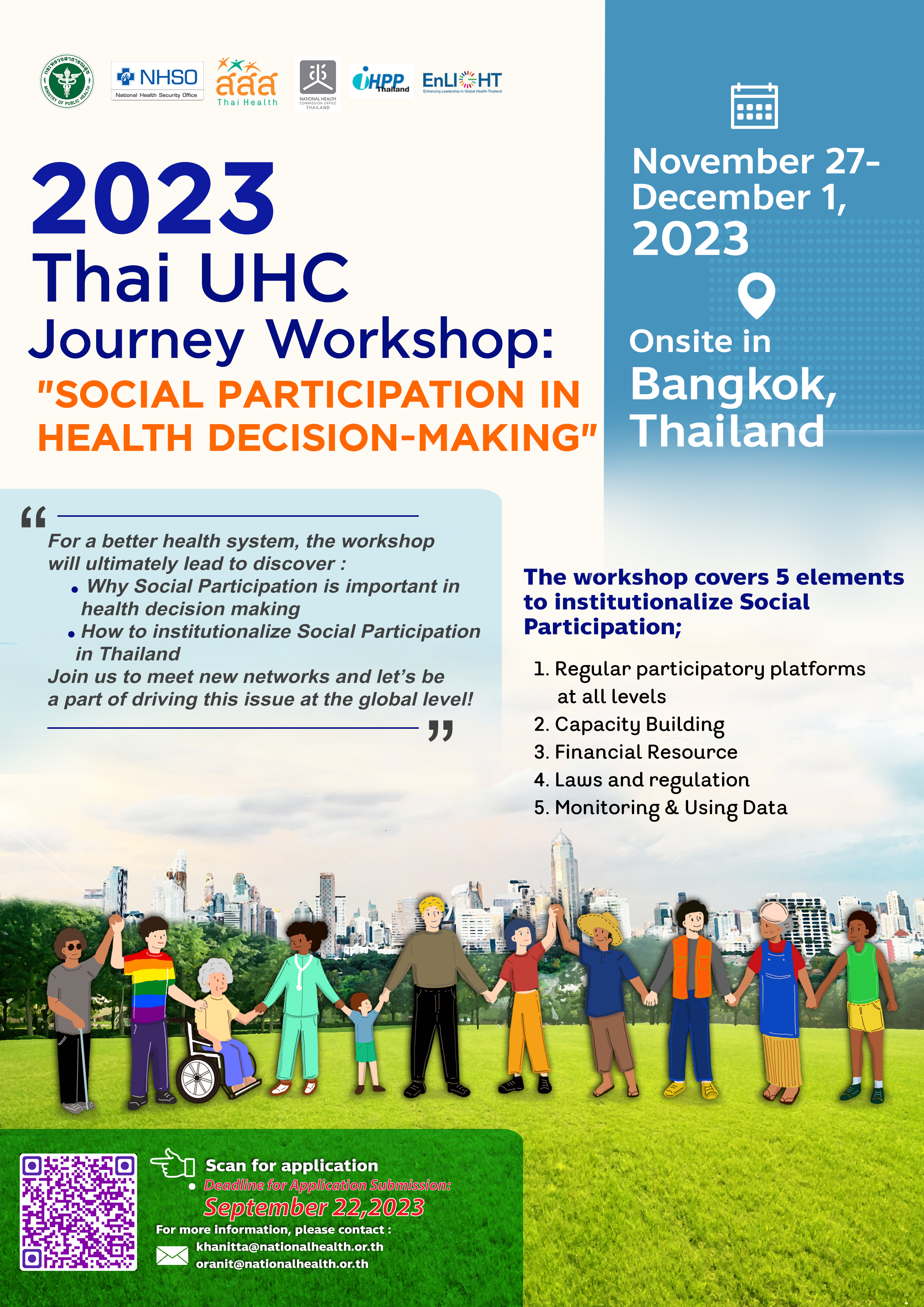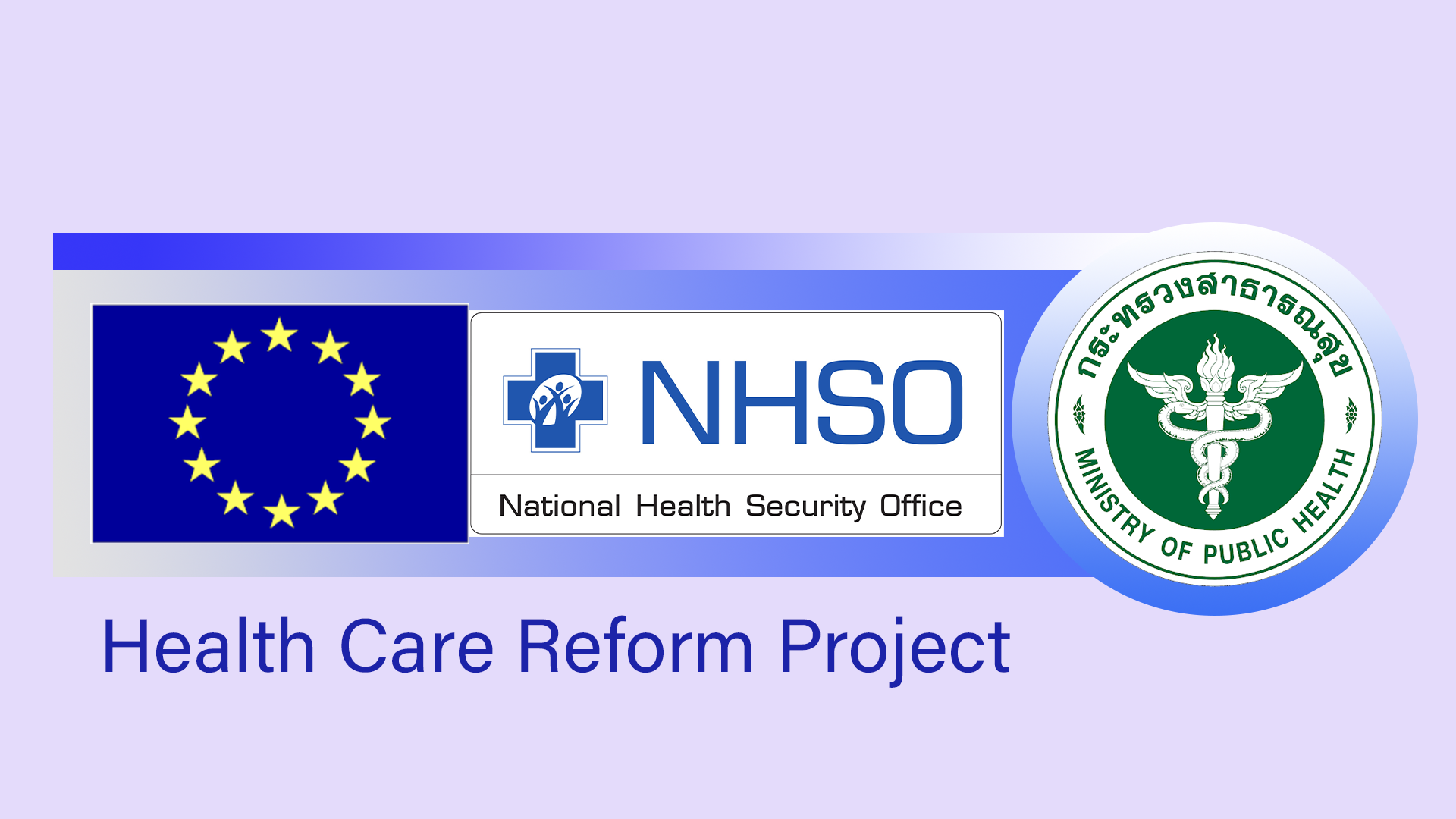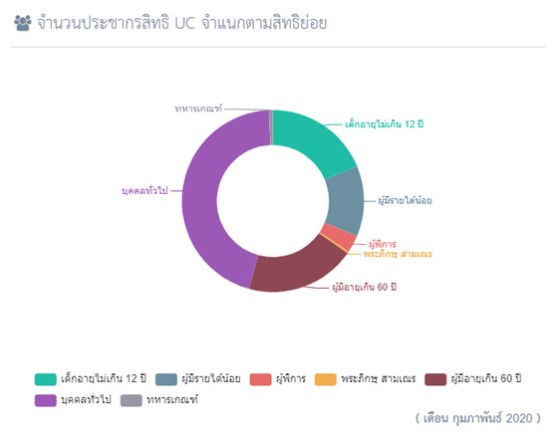Digital health promises better outcomes for Thai Universal Health Coverage

Digital health promises better outcomes for Thai Universal Health Coverage
Dr Sinchai Tawwuttanakidgul
Assistant Secretary-General of the National Health Security Office (NHSO)
With more than 65 million Thais covered by the government's healthcare schemes, an operator of each scheme must handle with the flux of information each day — from Beneficially enrollment, health providers’ registration and claim requests, the UHC members' questions and complaints, to the staff communication at the back office.
Under this circumstance, it's inevitable for the National Health Security Office (NHSO) to integrate "digital health" or the use of information and Communication Technology (ICT) for health in address health needs and support the management of Universal Coverage Scheme (UCS).
When the UCS was introduced in 2002, the NHSO began developing the ICT system to replace paper-based management setup that had been used among government offices for decades.
Each year, health providers submit more than 200 million claim requests for out-patient services and seven million for in-patient service to the NHSO. The value of the claims can reach between 400 and 500 million baht in total each day.
Such a large amount of data can't be dealt with a paper-based approach that means inefficiency, slower processes, and a requirement for more administrative resources. It's not a competent method for dealing with growing demands for medical services and the specific needs of some patient groups after the launch of the UCS.
Moreover, the people’s increasing access to medical services require ICT solutions for better outcomes.
Some specific population groups such as people living with HIV/AIDS require a data privacy system, in which the information of their identity and treatment should not be shared with the third party. In another case, health providers must use ICT so they can monitor the availability of medical equipment and supplies.
To manage the UCS effectively, the NHSO has integrated ICT solutions into both front and back office.
For the front office, the ICT is applied in the enrollment system, claim reimbursement, and activities relating to rights protection of the UCS members.
The enrollment system is one of the complex entities in the health system. Each Thai citizen can join only one healthcare scheme, for the time being, depending on their employment status.
For example, the children of civil servants are covered by Civil Servants Medical Benefits Scheme (CSMB). But when they reach the age of maturity, their healthcare coverage will shift to Social Security Scheme if they are employed in a formal sector, the UCS if they work in an informal sector, or the CSMB if they pursue their careers in civil services like their parents.
The changing of healthcare schemes requires the daily update through our ICT database.
Moreover, individuals are born and die every day. Many people also move across cities and require medical services in their destination. These are the information that must be updated too, through linking our data to civil registration and health providers' database.
This is not just for assuring people access to healthcare in whichever their employment statuses are or wherever they live. But it is also for making health providers feeling confident that they can claim money from the right sources whenever they provide services to anyone.
ICT plays a big part in the NHSO's reimbursement system, in which health providers must fill up electronic claim forms and submit them to the NHSO via an online channel. Our audit is done online too, while the transactions are done via the banking system.
Initially, the NHSO set up a call center to allow two-way communication between our staff and the UCS members. Now we've expanded the communication channel to social media and mobile applications where the UCS members can check their eligibility, benefits package, and process their registration for health units.
At the back office, ICT has supported the NHSO staff in completing several tasks, including fund management, budget planning, and resource allocation. We also use the e-bidding system and arrange the VDO conference to link our staff from across regions.
In the future, we've planned to improve our ICT system to help us manage the UCS more efficiently, timely, and accurately.
We've been looking at the ways we can use big data to improve our services. For example, we have a massive amount of information about disease prevalence and treatment outcomes obtained from health providers' claim documents collected over the years.
Making use of this data will allow health providers to improve their services that solve specific health problems in local areas. The data can be used to improve the health literacy of people, while being the valuable resources for health researchers.
We've also considered Artificial Intelligence and blockchain in our ICT system. However, we will need more investment in building digital infrastructure, developing hardware, and software — which are the tasks that require collaboration across multi-sectors.
Digital health is the future trend that we can't avoid. We must work on it if we want the UCS to perform better.
IN DEPTH
Digital health promises better outcomes for Thai Universal Health Coverage

Digital health promises better outcomes for Thai Universal Health Coverage
Dr Sinchai Tawwuttanakidgul
Assistant Secretary-General of the National Health Security Office (NHSO)
With more than 65 million Thais covered by the government's healthcare schemes, an operator of each scheme must handle with the flux of information each day — from Beneficially enrollment, health providers’ registration and claim requests, the UHC members' questions and complaints, to the staff communication at the back office.
Under this circumstance, it's inevitable for the National Health Security Office (NHSO) to integrate "digital health" or the use of information and Communication Technology (ICT) for health in address health needs and support the management of Universal Coverage Scheme (UCS).
When the UCS was introduced in 2002, the NHSO began developing the ICT system to replace paper-based management setup that had been used among government offices for decades.
Each year, health providers submit more than 200 million claim requests for out-patient services and seven million for in-patient service to the NHSO. The value of the claims can reach between 400 and 500 million baht in total each day.
Such a large amount of data can't be dealt with a paper-based approach that means inefficiency, slower processes, and a requirement for more administrative resources. It's not a competent method for dealing with growing demands for medical services and the specific needs of some patient groups after the launch of the UCS.
Moreover, the people’s increasing access to medical services require ICT solutions for better outcomes.
Some specific population groups such as people living with HIV/AIDS require a data privacy system, in which the information of their identity and treatment should not be shared with the third party. In another case, health providers must use ICT so they can monitor the availability of medical equipment and supplies.
To manage the UCS effectively, the NHSO has integrated ICT solutions into both front and back office.
For the front office, the ICT is applied in the enrollment system, claim reimbursement, and activities relating to rights protection of the UCS members.
The enrollment system is one of the complex entities in the health system. Each Thai citizen can join only one healthcare scheme, for the time being, depending on their employment status.
For example, the children of civil servants are covered by Civil Servants Medical Benefits Scheme (CSMB). But when they reach the age of maturity, their healthcare coverage will shift to Social Security Scheme if they are employed in a formal sector, the UCS if they work in an informal sector, or the CSMB if they pursue their careers in civil services like their parents.
The changing of healthcare schemes requires the daily update through our ICT database.
Moreover, individuals are born and die every day. Many people also move across cities and require medical services in their destination. These are the information that must be updated too, through linking our data to civil registration and health providers' database.
This is not just for assuring people access to healthcare in whichever their employment statuses are or wherever they live. But it is also for making health providers feeling confident that they can claim money from the right sources whenever they provide services to anyone.
ICT plays a big part in the NHSO's reimbursement system, in which health providers must fill up electronic claim forms and submit them to the NHSO via an online channel. Our audit is done online too, while the transactions are done via the banking system.
Initially, the NHSO set up a call center to allow two-way communication between our staff and the UCS members. Now we've expanded the communication channel to social media and mobile applications where the UCS members can check their eligibility, benefits package, and process their registration for health units.
At the back office, ICT has supported the NHSO staff in completing several tasks, including fund management, budget planning, and resource allocation. We also use the e-bidding system and arrange the VDO conference to link our staff from across regions.
In the future, we've planned to improve our ICT system to help us manage the UCS more efficiently, timely, and accurately.
We've been looking at the ways we can use big data to improve our services. For example, we have a massive amount of information about disease prevalence and treatment outcomes obtained from health providers' claim documents collected over the years.
Making use of this data will allow health providers to improve their services that solve specific health problems in local areas. The data can be used to improve the health literacy of people, while being the valuable resources for health researchers.
We've also considered Artificial Intelligence and blockchain in our ICT system. However, we will need more investment in building digital infrastructure, developing hardware, and software — which are the tasks that require collaboration across multi-sectors.
Digital health is the future trend that we can't avoid. We must work on it if we want the UCS to perform better.
Events
Digital health promises better outcomes for Thai Universal Health Coverage

Digital health promises better outcomes for Thai Universal Health Coverage
Dr Sinchai Tawwuttanakidgul
Assistant Secretary-General of the National Health Security Office (NHSO)
With more than 65 million Thais covered by the government's healthcare schemes, an operator of each scheme must handle with the flux of information each day — from Beneficially enrollment, health providers’ registration and claim requests, the UHC members' questions and complaints, to the staff communication at the back office.
Under this circumstance, it's inevitable for the National Health Security Office (NHSO) to integrate "digital health" or the use of information and Communication Technology (ICT) for health in address health needs and support the management of Universal Coverage Scheme (UCS).
When the UCS was introduced in 2002, the NHSO began developing the ICT system to replace paper-based management setup that had been used among government offices for decades.
Each year, health providers submit more than 200 million claim requests for out-patient services and seven million for in-patient service to the NHSO. The value of the claims can reach between 400 and 500 million baht in total each day.
Such a large amount of data can't be dealt with a paper-based approach that means inefficiency, slower processes, and a requirement for more administrative resources. It's not a competent method for dealing with growing demands for medical services and the specific needs of some patient groups after the launch of the UCS.
Moreover, the people’s increasing access to medical services require ICT solutions for better outcomes.
Some specific population groups such as people living with HIV/AIDS require a data privacy system, in which the information of their identity and treatment should not be shared with the third party. In another case, health providers must use ICT so they can monitor the availability of medical equipment and supplies.
To manage the UCS effectively, the NHSO has integrated ICT solutions into both front and back office.
For the front office, the ICT is applied in the enrollment system, claim reimbursement, and activities relating to rights protection of the UCS members.
The enrollment system is one of the complex entities in the health system. Each Thai citizen can join only one healthcare scheme, for the time being, depending on their employment status.
For example, the children of civil servants are covered by Civil Servants Medical Benefits Scheme (CSMB). But when they reach the age of maturity, their healthcare coverage will shift to Social Security Scheme if they are employed in a formal sector, the UCS if they work in an informal sector, or the CSMB if they pursue their careers in civil services like their parents.
The changing of healthcare schemes requires the daily update through our ICT database.
Moreover, individuals are born and die every day. Many people also move across cities and require medical services in their destination. These are the information that must be updated too, through linking our data to civil registration and health providers' database.
This is not just for assuring people access to healthcare in whichever their employment statuses are or wherever they live. But it is also for making health providers feeling confident that they can claim money from the right sources whenever they provide services to anyone.
ICT plays a big part in the NHSO's reimbursement system, in which health providers must fill up electronic claim forms and submit them to the NHSO via an online channel. Our audit is done online too, while the transactions are done via the banking system.
Initially, the NHSO set up a call center to allow two-way communication between our staff and the UCS members. Now we've expanded the communication channel to social media and mobile applications where the UCS members can check their eligibility, benefits package, and process their registration for health units.
At the back office, ICT has supported the NHSO staff in completing several tasks, including fund management, budget planning, and resource allocation. We also use the e-bidding system and arrange the VDO conference to link our staff from across regions.
In the future, we've planned to improve our ICT system to help us manage the UCS more efficiently, timely, and accurately.
We've been looking at the ways we can use big data to improve our services. For example, we have a massive amount of information about disease prevalence and treatment outcomes obtained from health providers' claim documents collected over the years.
Making use of this data will allow health providers to improve their services that solve specific health problems in local areas. The data can be used to improve the health literacy of people, while being the valuable resources for health researchers.
We've also considered Artificial Intelligence and blockchain in our ICT system. However, we will need more investment in building digital infrastructure, developing hardware, and software — which are the tasks that require collaboration across multi-sectors.
Digital health is the future trend that we can't avoid. We must work on it if we want the UCS to perform better.
RESOURCE CENTER
SECRETARY-GENERAL
Digital health promises better outcomes for Thai Universal Health Coverage

Digital health promises better outcomes for Thai Universal Health Coverage
Dr Sinchai Tawwuttanakidgul
Assistant Secretary-General of the National Health Security Office (NHSO)
With more than 65 million Thais covered by the government's healthcare schemes, an operator of each scheme must handle with the flux of information each day — from Beneficially enrollment, health providers’ registration and claim requests, the UHC members' questions and complaints, to the staff communication at the back office.
Under this circumstance, it's inevitable for the National Health Security Office (NHSO) to integrate "digital health" or the use of information and Communication Technology (ICT) for health in address health needs and support the management of Universal Coverage Scheme (UCS).
When the UCS was introduced in 2002, the NHSO began developing the ICT system to replace paper-based management setup that had been used among government offices for decades.
Each year, health providers submit more than 200 million claim requests for out-patient services and seven million for in-patient service to the NHSO. The value of the claims can reach between 400 and 500 million baht in total each day.
Such a large amount of data can't be dealt with a paper-based approach that means inefficiency, slower processes, and a requirement for more administrative resources. It's not a competent method for dealing with growing demands for medical services and the specific needs of some patient groups after the launch of the UCS.
Moreover, the people’s increasing access to medical services require ICT solutions for better outcomes.
Some specific population groups such as people living with HIV/AIDS require a data privacy system, in which the information of their identity and treatment should not be shared with the third party. In another case, health providers must use ICT so they can monitor the availability of medical equipment and supplies.
To manage the UCS effectively, the NHSO has integrated ICT solutions into both front and back office.
For the front office, the ICT is applied in the enrollment system, claim reimbursement, and activities relating to rights protection of the UCS members.
The enrollment system is one of the complex entities in the health system. Each Thai citizen can join only one healthcare scheme, for the time being, depending on their employment status.
For example, the children of civil servants are covered by Civil Servants Medical Benefits Scheme (CSMB). But when they reach the age of maturity, their healthcare coverage will shift to Social Security Scheme if they are employed in a formal sector, the UCS if they work in an informal sector, or the CSMB if they pursue their careers in civil services like their parents.
The changing of healthcare schemes requires the daily update through our ICT database.
Moreover, individuals are born and die every day. Many people also move across cities and require medical services in their destination. These are the information that must be updated too, through linking our data to civil registration and health providers' database.
This is not just for assuring people access to healthcare in whichever their employment statuses are or wherever they live. But it is also for making health providers feeling confident that they can claim money from the right sources whenever they provide services to anyone.
ICT plays a big part in the NHSO's reimbursement system, in which health providers must fill up electronic claim forms and submit them to the NHSO via an online channel. Our audit is done online too, while the transactions are done via the banking system.
Initially, the NHSO set up a call center to allow two-way communication between our staff and the UCS members. Now we've expanded the communication channel to social media and mobile applications where the UCS members can check their eligibility, benefits package, and process their registration for health units.
At the back office, ICT has supported the NHSO staff in completing several tasks, including fund management, budget planning, and resource allocation. We also use the e-bidding system and arrange the VDO conference to link our staff from across regions.
In the future, we've planned to improve our ICT system to help us manage the UCS more efficiently, timely, and accurately.
We've been looking at the ways we can use big data to improve our services. For example, we have a massive amount of information about disease prevalence and treatment outcomes obtained from health providers' claim documents collected over the years.
Making use of this data will allow health providers to improve their services that solve specific health problems in local areas. The data can be used to improve the health literacy of people, while being the valuable resources for health researchers.
We've also considered Artificial Intelligence and blockchain in our ICT system. However, we will need more investment in building digital infrastructure, developing hardware, and software — which are the tasks that require collaboration across multi-sectors.
Digital health is the future trend that we can't avoid. We must work on it if we want the UCS to perform better.
VIDEOS
Thailand's UHC Journey
UHC Public relations












